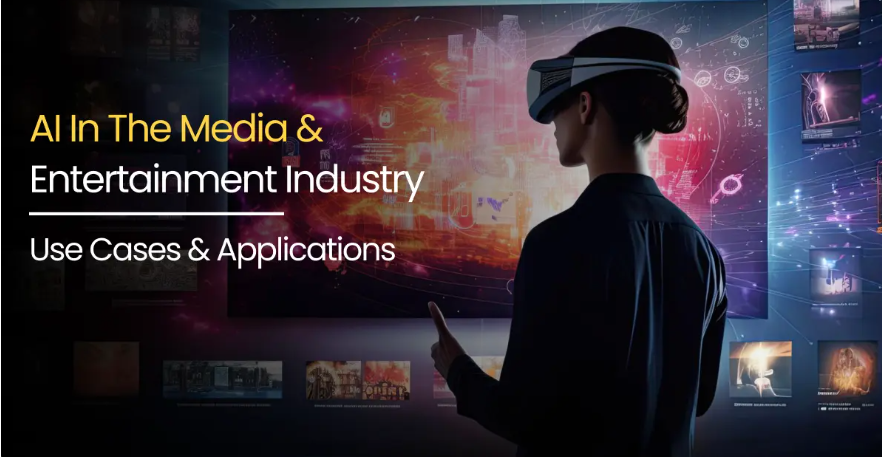AI in Media and Entertainment: Transforming the Landscape

Creative Job Platform - Find Jobs

Follow Us
Download Diffr App
Share This Post
The media and entertainment industry is undergoing a massive transformation, with artificial intelligence (AI) taking center stage in reshaping how content is created, delivered, and consumed. AI is optimizing processes, personalizing user experiences, and unlocking new creative possibilities. Its ability to analyze vast datasets, streamline workflows, and cater to diverse audience preferences makes entertainment more accessible and engaging for everyone, including those with hectic lifestyles who might otherwise struggle to find time for traditional entertainment formats.
In this blog, we will explore the multifaceted influence of AI in media and entertainment, from current market trends and key benefits to real-world applications. We will also discuss the ethical considerations of AI adoption and look ahead to the exciting possibilities that AI brings to the future of entertainment.
The Impact of AI on Media and Entertainment
AI is influencing every corner of the media and entertainment industry, from content creation to audience engagement. Here are some key areas where AI is making waves:
Enhanced Content Creation
AI is revolutionizing content creation by automating tasks that were once manual and time-consuming. For example, machine learning algorithms can assist in scriptwriting, suggesting plot twists, character development, and even dialogue enhancements. AI can analyze massive data sets from past successful films or TV shows to predict what might work in the future. Music composition is another area where AI shines, as it can generate original compositions by learning from a wide range of genres and styles. Moreover, in graphic design and animation, AI tools help create more realistic visuals more efficiently, reducing the time spent on intricate tasks.
Personalized Consumer Experiences
AI-powered personalization is at the heart of streaming platforms like Netflix, Spotify, and YouTube. By analyzing user behavior and preferences, these platforms offer tailor-made content recommendations, enhancing customer satisfaction and keeping audiences engaged. Beyond recommendations, AI chatbots and virtual assistants are also being employed to provide personalized customer service, ensuring a smooth and interactive user experience.
Automation of Production and Distribution
AI has streamlined the media production and distribution process. In film, for instance, AI can help editors by identifying the best takes, significantly reducing post-production time. Similarly, AI tools analyze reader preferences in publishing, helping companies optimize content distribution to reach the right audiences at the right time. This not only increases efficiency but also maximizes content impact.
Targeted Advertising and Marketing Innovations
In the digital age, targeted advertising is essential, and AI enables brands to better target their audiences. Through programmatic advertising, AI automates ad placement, ensuring that the right consumers see the right ads based on their preferences and online behavior. AI also helps in creating content that resonates with the audience by analyzing trends on social media and online platforms. This leads to higher engagement and conversion rates.
AI in the Media & Entertainment Market: Current Trends
According to Vision Research Reports, The global AI in the media & entertainment market experienced significant growth, reaching USD 13.8 billion in 2022
The adoption of AI in the media and entertainment sector is rapidly accelerating. According to Vision Research Reports, the global AI market in this sector was valued at USD 13.8 billion in 2022 and is projected to reach USD 150 billion by 2032. This significant growth reflects the increasing reliance on AI for various applications, including video production, content recommendation, and audience analytics.
Some key market insights include:
- The AI services segment held over 59% of the market share in 2022.
- AI for video production received considerable attention due to its potential to streamline workflows and enhance creativity.
- North America accounted for more than 38% of the global AI revenue in media and entertainment in 2022, positioning itself as a leader in AI-driven content innovation.
Key Benefits of AI in Media and Entertainment
AI is delivering several tangible benefits to the media and entertainment industry, driving efficiency and creativity:
Hyper-Personalization
AI enables precise content recommendations by analyzing individual preferences and behavior patterns. This level of personalization not only improves user satisfaction but also boosts engagement and loyalty, giving companies a competitive edge.
Data-Driven Insights for Strategic Decision-Making
AI provides actionable insights that help media companies make data-backed decisions. Audience analytics, predictive modeling, and social sentiment analysis inform everything from content creation to marketing strategy. This shift from intuition to data-driven decision-making results in more targeted and effective campaigns.
AI as a Creative Catalyst
AI is enhancing, not replacing, human creativity. By providing objective analysis of scripts, assisting composers in creating original music, and helping designers with CGI and animation, AI acts as a powerful tool that allows creators to focus more on innovation while reducing time spent on routine tasks.
Challenges and Ethical Considerations
While the benefits of AI are numerous, its adoption is not without challenges. Ethical concerns like data privacy and the potential for AI to perpetuate biases need to be addressed. Additionally, there are concerns about job displacement as AI automates tasks that were traditionally done by humans. To mitigate these challenges, companies must emphasize the responsible use of AI, ensuring a balance between technological advancements and human creativity.
The Future of AI in Media and Entertainment
Looking ahead, AI will continue to play a transformative role in the media and entertainment industry. Technologies like augmented reality (AR) and virtual reality (VR), powered by AI, are set to create immersive experiences that blend the digital and physical worlds. Additionally, AI will be crucial in content moderation, helping platforms filter harmful or misleading content while upholding free expression.
Conclusion
AI is not just a trend in media and entertainment—it is shaping the future of the industry. From content creation to personalized experiences, AI is improving how we produce, distribute, and consume media. As we move forward, it is essential to adopt AI responsibly, ensuring that it enhances human creativity while addressing ethical challenges. With AI, the future of media and entertainment promises to be more personalized, efficient, and innovative than ever before.
By embracing AI, content creators and media companies can ensure they stay ahead of the curve, delivering exceptional experiences that cater to an increasingly diverse and discerning audience.
You Might be Interested
-
Top 10 In-Demand Creative Skills to Learn After 12th in 2024
-
Why Creative Agencies Should Outsource Talent in 2024: Unlocking Flexibility and Expertise
-
Remote Hiring for Creative Professionals: Challenges and Solutions
-
AI in Media and Entertainment: Transforming the Landscape
-
Top 10 High-Paying Creative Careers in India (2024)



